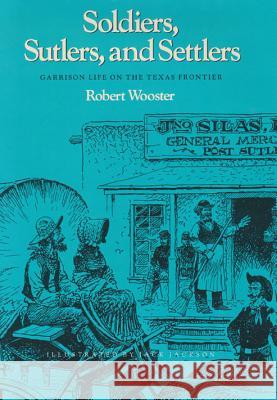Soldiers, Sutlers, and Settlers: Garrison Life on the Texas Frontier » książka
Soldiers, Sutlers, and Settlers: Garrison Life on the Texas Frontier
ISBN-13: 9781585440641 / Angielski / Miękka / 1987 / 260 str.
Texas' frontiers in the 1840s were buffeted by disputes with Mexico and attacks by Indian tribes who refused to give up their life-styles to make way for new settlers. To ensure some measure of peace in the far reaches of Texas, the U.S. Army established a series of military forts in the state. These outposts varied in size and amenities, but the typical installation was staffed with officers, enlisted men, medical personnel, and civilian laundresses. Many soldiers brought their families to the frontier stations. While faced with the hardships of post life, wives and children helped create a more congenial environment for all concerned.
In this, the second volume in the Clayton Wheat Williams Texas Life Series, historian Robert Wooster covers life at the forts from reveille to taps, detailing the soldiers' uniforms, weapons, and duties, along with the activities of the local civilian inhabitants.
As the numerous anecdotes of post residents show, military life on the Texas frontier was not one long battle against Indians or invaders. Many of the daily battles waged were against roaches, cholera, inappropriate government-issue items, harsh weather, and personalities. The presence of women in the forts was considered a healthy and civilizing influence by some; others doubted the morals of the fort's laundresses among lonely enlisted men. Despite the popularity of gambling and drinking, family environments did flourish at many posts: school was taught, dramatic entertainments were performed, religious services were held, and dances were organized to celebrate almost any occasion.
A variety of troops manned the army's Texas posts. Blacks and whites, immigrants and Easterners, West Pointers and illiterates all contributed to garrison life. Their presence in Texas until the building of the railroads and defeat of the Indians prompted the closing of the forts affected the state dramatically, often in more subtle ways than fighting. As Sgt. H. H. McConnell explained in the 1880s, "if we didn't actually kill many Indians, who shall say... the army] was not a potent factor in 'settling up the country.'"











